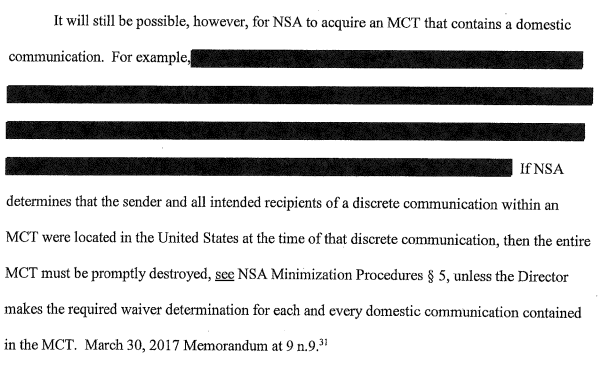Coats v. Wyden, the Orwellian Reclassification Edition
Back on June 7, Ron Wyden asked a question similar to the one he asked James Clapper in 2013: “Can the government use FISA 702 to collect communications it knows are entirely domestic?” As Clapper did 4 years before ,Coats denied that it could. “Not to my knowledge. It would be against the law.”
The claim was particularly problematic, given that less than two months earlier, Coats had signed a Section 702 certificate that admitted that the NSA would acquire entirely domestic communications via upstream collection.

When I asked ODNI about Coats’ comment, they responded by citing FISA.
Section 702(b)(4) plainly states we “may not intentionally acquire any communication as to which the sender and all intended recipients are known at the time of acquisition to be located in the United States.” The DNI interpreted Senator Wyden’s question to ask about this provision and answered accordingly.
On June 15, Wyden — as he had in 2013 — insisted that Coats answer the question he asked, not the one that made for easy public assurances.
That was not my question. Please provide a public response to my question, as asked at the June 7, 2017 hearing.
After Wyden asked a few more times — again, as happened in 2013 — Coats provided a classified response on July 24. On September 1, however, Coats wrote Wyden stating that,
After consulting with the relevant intelligence agencies, I concluded that releasing the information you are asking to be made public would cause serious damage to national security. To that end, I provided you a comprehensive classified response to your question on July 24.
[snip]
While I recognize your goal of an unclassified response, given the need to include classified information to fully address your question, the classified response provided on July 24 stands as our response on this matter.”
Wyden is … unsatisfied … with this response.
It is hard to view Director Coats’ behavior as anything other than an effort to keep Americans in the dark about government surveillance. I asked him a simple, yes-or-no question: Can the government use FISA Act Section 702 to collect communications it knows are entirely domestic?
What happened was almost Orwellian. I asked a question in an open hearing. No one objected to the question at the time. Director Coats answered the question. His answer was not classified. Then, after the fact, his press office told reporters, in effect, Director Coats was answering a different question.
I have asked Director Coats repeatedly to answer the question I actually asked. But now he claims answering the question would be classified, and do serious damage to national security.
The refusal of the DNI to answer this simple yes-no question should set off alarms. How can Congress reauthorize this surveillance when the administration is playing games with basic questions about this program?
This is on top of the administration’s recent refusal even to estimate how many Americans’ communications are swept up under this program.
The Trump administration appears to have calculated that hiding from Americans basic information relevant to their privacy is the easiest way to renew this expansive surveillance authority. The executive branch is rejecting a fundamental principle of oversight by refusing to answer a direct question, and saying that Americans don’t deserve to know when and how the government watches them.
Significantly, in the midst of this back-and-forth about targeting, Wyden and Coats were engaged in a parallel back-and-forth about counting how many US persons are impacted by Section 702. In a letter sent to Coats on August 3, Wyden suggested that it might be easier for NSA to count how many people located in the US are affected by Section 702.
First, whatever challenges there may be arriving at an estimate of U.S. persons whose communications have been collected under Section 702, those challenges may not apply equally to persons located in the United States. I believe that the impact of Section 702 on persons inside the United States would constitute a “relevant metric,” and that your conclusion that an estimate can and should be revisited on that basis.
So effectively, Coats is willing to say publicly that the NSA can’t knowingly target entirely domestic communications, but it does knowingly collect entirely domestic communications. But he’s unwilling to explain how or why it continues to do so in the wake of ending “about” collection.
And in the middle of Coats’ non-admission, Wyden challenged him to come up with a count of how many people in America are affected by Section 702, which would presumably include those incidentally collected because they were communicated with a target, but also these entirely domestic communications that Coats admits exist but won’t explain.
I’ll try to explain in a follow-up what I think this is about.